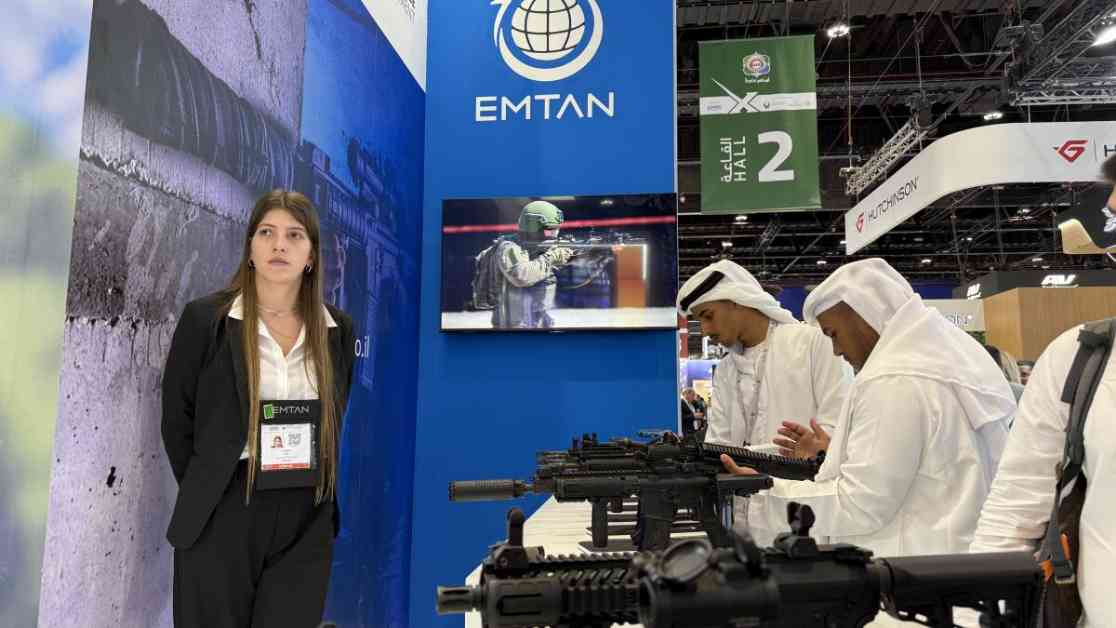Amidst the backdrop of global turmoil and regional conflicts, the International Defense Exhibition and Conference held at Abu Dhabi, United Arab Emirates, showcased a diverse array of weaponry from around the world. At this biennial arms fair, a myriad of countries gathered to display their latest innovations in defense technology, from Brazilian ballistic munitions to Indian patrol boats and cutting-edge AI-enabled drones from the U.S. Notably, Israel emerged as a prominent participant, with 34 companies showcasing their products, underscoring the unexpected resilience of Israel’s trade relations with Arab nations in the wake of escalating tensions triggered by Hamas’ attacks on October 7, 2023.
Despite global condemnations of Israel’s military actions in regions like Gaza, Lebanon, and Yemen, the atmosphere at the arms fair seemed surprisingly relaxed, especially at the Israeli pavilion. Amidst a melting pot of languages and cultures, attendees marveled at the innovative displays of drones, smart surveillance devices, and communication equipment. One significant hit among the spectators was a virtual reality demonstration by Israel Aerospace Industries, highlighting their combat-proven systems used in recent conflicts. Ron Pollak, the vice president of sales and marketing at Israeli arms manufacturer Emtan, expressed how the market potential and safety of the UAE contributed to their continued participation in events like IDEX.
The presence of Israeli firms at IDEX would have been unthinkable just a few years ago, but with the signing of the U.S.-brokered Abraham Accords, the landscape of diplomatic relations in the Middle East has drastically shifted. The accords, which led to the UAE recognizing Israeli sovereignty, paved the way for increased collaborations between Israeli and Emirati companies in various sectors. This newfound partnership has weathered the storm of conflicts with Hamas, despite accusations of genocide and ethnic cleansing in the Gaza Strip.
The ongoing strife between Israel and Hamas, marked by ceasefires and renewed hostilities, has not deterred the growth of business ties between Israel and Arab nations. The UAE, serving as Israel’s top Arab business partner, saw a significant increase in trade with Israel in 2024, surpassing $3.2 billion. Similarly, other Arab countries like Egypt and Jordan have seen economic benefits from their engagements with Israel, particularly in sectors like natural gas exports. These trade relationships, though shrouded in political complexities, underscore the strategic importance of economic cooperation in the region.
While diplomatic normalization remains a distant goal, Israel’s continued efforts to foster relationships with nations like Saudi Arabia reflect a broader geopolitical strategy to counter shared threats, particularly from Iran. At the forefront of these diplomatic endeavors are companies like Smartshooter, which leverage cutting-edge technologies like artificial intelligence to enhance the accuracy and lethality of small arms. Abraham Mazor, the vice president of business development at Smartshooter, emphasized the importance of collaboration with nations seeking innovation and technological advancements in defense.
As attendees at IDEX explored the latest advancements in military technology, the spirit of partnership and innovation prevailed, transcending political divides and cultural differences. With a shared goal of enhancing security and protecting lives, companies from various nations engaged in meaningful exchanges, fostering a sense of camaraderie amidst the backdrop of global conflicts and regional tensions. The arms fair served as a microcosm of the complex dynamics at play in the Middle East, where business, diplomacy, and defense intertwine to shape the future of the region.















